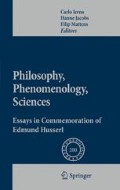Abstract
When Husserl explicitly construed his phenomenology as first philosophy, he knew that he was placing himself into a long tradition in Western philosophy.1 One can witness the emergence of this project of phenomenology as first philosophy already in the first decade of the twentieth century, in the wake of the establishing phenomenology as mathesis universalis.
*Thanks go to the following colleagues who have given me helpful feedback on earlier versions of this paper: Ullrich Melle, Rochus Sowa, Dieter Lohmar, Henning Peucker, Thane M. Naberhaus, Volker Peckhaus, Daniel Dwyer, Steven G. Crowell, as well as the members of my graduate seminar on Early German Idealism in the spring of 2009 at Marquette University, who continued to pose penetrating questions, which, hopefully, helped me clarify my thoughts. All translations from the German, unless otherwise noted, are mine. Any remaining shortcomings are entirely my fault.
Access this chapter
Tax calculation will be finalised at checkout
Purchases are for personal use only
Preview
Unable to display preview. Download preview PDF.
Bibliography
Dorion Cairns, ConversationsWith Husserl and Fink (The Hague: Nijhoff,1976).
Carleton B. Christensen, Self and World. From Analytic Philosophy to Phenomenology(Berlin: de Gruyter, 2008).
Frederick C. Beiser, The Fate of Reason: German Philosophy From Kant to Fichte (Cambridge, Mass: Harvard University Press, 1987).
Marvin Farber, “First Philosophy and the Problem of the World,” in: Philosophy and Phenomenological Research XXIII/3 (1963), pp. 315–334.
Johann Gottlieb Fichte, “Review of Aenesidemus,” in: George di Giovanni &H. S. Harris (eds.), Between Kant and Hegel. Texts in the Development of Post-Kantian Idealism (Indianapolis/Cambridge: Hackett, 2000), pp.136–157.
Denis Fisette, “Husserl et Fichte: Remarques sur l’apport de l’idéalisme dans le développement de la phénoménologie,” in: Symposium: Canadian Journal of Continental Philosophy (Revue canadienne de philosophie continentale) 3.2 (1999), pp. 185–207.
James G. Hart, “Husserl and Fichte: With Special Regard to Husserl’sLectures on ‘Fichte’s Ideal of Humanity’,” in: Husserl Studies 12 (1995),pp. 135–163.
Edmund Husserl, Aufsätze und Vorträge (1911-1921), ed. by Thomas Nenon and Hans Rainer Sepp, Husserliana XXV (Dordrecht: Kluwer,1987).
Edmund Husserl, Einführung in die Phänomenologie der Erkenntnis. Vorlesung 1909, ed. by Elisabeth Schuhmann, Husserliana Materialienbände VII (Dordrecht:Kluwer, 2005).
Edmund Husserl, Einleitung in die Philosophie. Vorlesung 1922/23, ed. by Berndt Goossens,Husserliana XXXV (Dordecht: Kluwer, 2002).
Edmund Husserl, Erste Philosophie (1923/24). Erster Teil: Kritische Ideengeschichte, ed. by Rudolf Boehm, Husserliana VII (Den Haag: Nijhoff, 1956).
Edmund Husserl, Erste Philosophie (1923/24). Zweiter Teil: Theorie der phänomenologischen Reduktion, ed. by Rudolf Boehm, Husserliana VIII (Den Haag:Nijhoff, 1959).
Edmund Husserl, Zur phänomenologischen Reduktion. Texte aus dem Nachlass (1926-1935), ed. by Sebastian Luft, Husserliana XXXIV (Dordrecht: Kluwer, 2002).
Sebastian Luft, “Phänomenologie als erste Philosophie und das Problemder Wissenschaft von der Lebenswelt,” in: Archiv für Begriffsgeschichte52/2010 (forthcoming).
Jitendrah Nath Mohanty, The Philosophy of Edmund Husserl. A Historical Development (New Haven/London: Yale, 2008).
Wolfgang Kersting & Dirk Westerkamp (eds.), Am Rande des Idealismus. Studien zur Philosophie Karl Leonhard Reinholds (Paderborn: Mentis,2008).
Vesa Oittinen, “Über einige phänomenologische Motive in Reinholds
Philosophie,” in: Archivo di Filosofia, LXXIII (2005), 1-3: K.L. Reinhold Alle Soglie dell’ Idealismo, Pisa/Roma: Instituti Editoriale e Poligrafici Internazionali, pp. 115–128.
Karl Leonhard Reinhold, “The Foundations of Philosophical Knowledge,”in: George di Giovanni & H. S. Harris (eds.), Between Kant and Hegel.Texts in the Development of Post-Kantian Idealism (Indianapolis / Cambridge:Hackett, 2000), pp. 51–103.
Thomas Rockmore, “Fichte, Husserl, and Philosophical Science,” in: International Philosophical Quarterly 19 (1979), pp. 15–27.
Karl Schuhmann, Husserl-Chronik. Denk- und Lebensweg Edmund Husserls(Den Haag: Nijhoff, 1981).
Thomas M. Seebohm, “Fichte’s and Husserl’s Critique of Kant’s Transcendental deduction,” in: Husserl Studies 2 (1985), pp. 53–74.
Jürgen Stolzenberg, “‘Ich lebe in einer neuenWelt!’ Zum Verhältnis Kant — Fichte,” in: Hans Feger et al. (eds.), Philosophie des deutschen Idealismus(Würzburg: Königshausen & Neumann, 2010) (in press).
Hartmut Tietjen, Husserl und Fichte. Letztbegründung, Subjektivität und praktische Vernunft im transzendentalen Idealismus (Frankfurt: Klostermann,1980).
Author information
Authors and Affiliations
Corresponding author
Editor information
Editors and Affiliations
Rights and permissions
Copyright information
© 2010 Springer Science+Business Media B.V.
About this chapter
Cite this chapter
Luft*, S. (2010). Phenomenology as First Philosophy: A Prehistory. In: Mattens, F., Jacobs, H., Ierna, C. (eds) Philosophy, Phenomenology, Sciences. Phaenomenologica, vol 200. Springer, Dordrecht. https://doi.org/10.1007/978-94-007-0071-0_6
Download citation
DOI: https://doi.org/10.1007/978-94-007-0071-0_6
Published:
Publisher Name: Springer, Dordrecht
Print ISBN: 978-94-007-0070-3
Online ISBN: 978-94-007-0071-0
eBook Packages: Humanities, Social Sciences and LawPhilosophy and Religion (R0)

